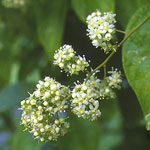 The annals of Traditional Chinese Medicine are home to a long list of alternative therapies. Those that come in supplement form largely come from the realm of herbal medicine. Here is news on a very powerful-sounding herb, which could have huge medicinal rewards for humans. Its name is “lei gong teng.” Or, to put it another way, “thunder god vine.” And it could block cancer.
The annals of Traditional Chinese Medicine are home to a long list of alternative therapies. Those that come in supplement form largely come from the realm of herbal medicine. Here is news on a very powerful-sounding herb, which could have huge medicinal rewards for humans. Its name is “lei gong teng.” Or, to put it another way, “thunder god vine.” And it could block cancer.
Researchers at Johns Hopkins School of Medicine have discovered that a product isolated from the thunder god vine works by blocking something in the genetic pathway of our cells. The report suggests that this herbal agent could be so powerful that new anticancer drugs could be developed from it.
Thunder god vine has been used for hundreds of years to treat a slew of conditions, including rheumatoid arthritis. The herb is known for its ability to lower inflammation, suppressive an overactive immune system and potentially fight tumors. In 1972, scientists discovered its active ingredient, “triptolide,” and that it stops cell growth. But only now do we know how it does so.
Triptolide has been shown in animal studies to fight cancer and arthritis effectively. It’s also been shown to block the growth of cells in the body, even causing some cell lines to die. This, of course, would come in handy when fighting cells overrun with cancer.
The researchers looked at how much new DNA, RNA and protein are made in cells. They treated some cells with triptolide for one hour and found that these took much longer to have an effect on the levels of new proteins and DNA. Yet, they almost immediately blocked the creation of new RNA. Without getting overly technical (because studying molecules in the human body gets pretty complex), the researchers tried to uncover which group of enzymes and which proteins triptolide affects. And how it then stops cells from growing.
It’s important to know exactly how it works, so that other medicines can be created that target the same thing. Eventually, the researchers found that triptolide directly blocks the activity of one particular protein, “XPB.” They backed this up with subsequent research that found chemicals related to triptolide were effective at decreasing XPB activity and stopping cell growth.
This, they say, explains how the thunder god vine may work against inflammation and cancer. The future of cancer therapy may lie in part within the folds of this Chinese herb, widely available in herbal shops and pharmacies. However, please note that products currently available are not necessarily safe or appropriate for use. Talk to your doctor before you try thunder god vine. Many parts of the thunder god plant are poisonous and, if the extract is not made correctly by a reputable source, it can be lethal. The properly made thunder god extract can also cause side effects, such as diarrhea, upper respiratory tract infections, skin rash, and hair loss. It may be advisable to wait until a good-quality, American-made extract is available.
